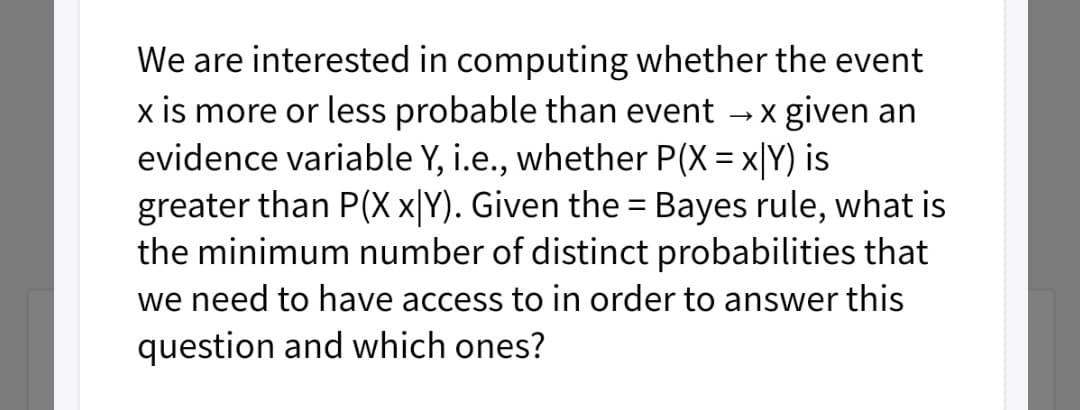We are interested in computing whether the event x is more or less probable than event evidence variable Y, i.e., whether P(X = x|Y) is greater than P(X x[Y). Given the = Bayes rule, what is the minimum number of distinct probabilities that x given an we need to have access to in order to answer this question and which ones?
We are interested in computing whether the event x is more or less probable than event evidence variable Y, i.e., whether P(X = x|Y) is greater than P(X x[Y). Given the = Bayes rule, what is the minimum number of distinct probabilities that x given an we need to have access to in order to answer this question and which ones?
College Algebra
7th Edition
ISBN:9781305115545
Author:James Stewart, Lothar Redlin, Saleem Watson
Publisher:James Stewart, Lothar Redlin, Saleem Watson
Chapter9: Counting And Probability
Section9.2: Probability
Problem 31E
Related questions
Question

Transcribed Image Text:We are interested in computing whether the event
x is more or less probable than event
evidence variable Y, i.e., whether P(X = x|Y) is
greater than P(X x[Y). Given the = Bayes rule, what is
the minimum number of distinct probabilities that
x given an
we need to have access to in order to answer this
question and which ones?
Expert Solution
This question has been solved!
Explore an expertly crafted, step-by-step solution for a thorough understanding of key concepts.
Step by step
Solved in 3 steps with 2 images

Recommended textbooks for you

College Algebra
Algebra
ISBN:
9781305115545
Author:
James Stewart, Lothar Redlin, Saleem Watson
Publisher:
Cengage Learning

Algebra and Trigonometry (MindTap Course List)
Algebra
ISBN:
9781305071742
Author:
James Stewart, Lothar Redlin, Saleem Watson
Publisher:
Cengage Learning

College Algebra
Algebra
ISBN:
9781305115545
Author:
James Stewart, Lothar Redlin, Saleem Watson
Publisher:
Cengage Learning

Algebra and Trigonometry (MindTap Course List)
Algebra
ISBN:
9781305071742
Author:
James Stewart, Lothar Redlin, Saleem Watson
Publisher:
Cengage Learning